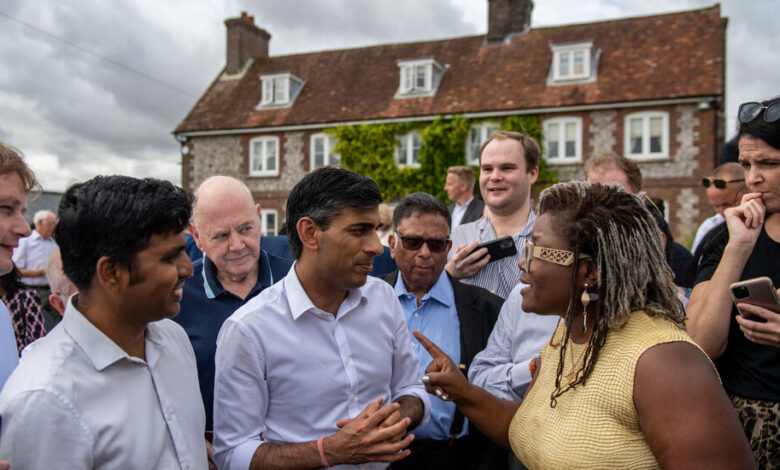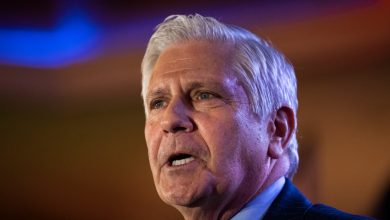Rishi Sunak Has a Sterling Résumé. It’s Not Helping Him Replace Boris Johnson.

CARDIFF, Wales — Just a few weeks ago Rishi Sunak, the former chancellor of the Exchequer, seemed well-placed to become Britain’s next prime minister, topping the short list of two contenders selected by Conservative Party lawmakers to replace the departing Boris Johnson.
With an impeccable résumé, a reputation for competence and a reservoir of good will from having guided Britain’s economy through the pandemic, Mr. Sunak was regarded as perhaps the country’s brainiest, most polished and most successful frontline politician.
But some of those same qualities now seem to be working against him. That resistance has hindered his pursuit of 10 Downing Street, according to opinion polls that show him trailing the foreign secretary, Liz Truss, in the race to succeed Mr. Johnson, with the winner to be announced on Sept. 5.
Mr. Sunak’s diminished fortunes have added urgency to his campaign as he faces off with Ms. Truss in a series of debates across Britain. At an event in Cardiff, he bounded onto the stage with a broad smile and pleaded for votes from hundreds of activists in his party who will be among those who decide the outcome of the contest.
“I will give you my everything, my heart and my soul — everything I’ve got,” he said, turning to face different parts of the hall and promising to make his audience “feel enormously proud of the Conservative government that I will be privileged to lead.”
Mr. Sunak, 42, received warm applause, and outside the hall, Paul Fisher, an accountant from Blackwood, said he was likely to vote for the former chancellor because “economically, he seems like the safer pair of hands.” But even he added that Mr. Sunak “does come across as a bit too polished.”
Mr. Johnson’s departure from Downing Street after a series of scandals has left the ultimate decision on his successor in the hands of around 160,000 Conservative Party members, a small “selectorate” that, by definition, is more right-wing than the general population but also whiter, older and more male.
Many remain loyal to Mr. Johnson, and that has also created a problem for Mr. Sunak: He has been accused of treachery by some Conservative Party members because his cabinet resignation last month helped set off the rebellion against the prime minister.
A politician unaccustomed to failure, Mr. Sunak, was until recently the undisputed rising star of British politics after a meteoric ascent that took him from newbie lawmaker to chancellor of the Exchequer in less than five years.
He is also a walking success story of multiracial Britain, having been born in Southampton, on the south coast, to parents of Indian heritage who settled in the country six decades ago. If he wins the election, Mr. Sunak would become Britain’s first prime minister of color.
Mr. Sunak’s father was a family doctor, his mother ran a pharmacy, and they saved money to send him to Winchester College, one of Britain’s most elite and academically rigorous fee-paying schools.
He graduated with a top degree from Oxford University and then attended Stanford University, where he met his future wife, Akshata Murty, the daughter of an Indian technology billionaire.
Mr. Sunak made his own fortune in finance, including a spell at Goldman Sachs, and entered Parliament in 2015, becoming chancellor of the Exchequer in 2020 at age 39. His popularity surged during the pandemic when the Treasury dispensed billions to save jobs and support struggling Britons.
But setbacks followed with revelations early this year that Ms. Murty had limited her tax exposure in Britain; after the furor, and days of negative headlines, she volunteered to pay the extra tax. Mr. Sunak was also criticized when it emerged that he had retained a U.S. green card, which would allow him to live permanently in the United States. He gave it up before making his first visit to the country as chancellor last October.
And while his top-notch résumé might be a dream for recruiters, it seems less popular with Conservative Party members drawn from provincial Britain.
With homes in London, in his parliamentary constituency in Yorkshire and in Santa Monica, Calif., Mr. Sunak looks like a prosperous international jet-setter, because that’s what he is.
“He is, in the end, perhaps just too shiny for the party membership,” said Tim Bale, a professor of politics at Queen Mary University of London. He added that with inflation soaring, interest rates rising and recession looming, Conservatives may think it is hard for someone of such affluence to appreciate the problems confronting ordinary Britons.
“They do live in the real world,” Professor Bale said of party members, “and I think, in some ways, there was always a degree of suspicion that Rishi Sunak simply doesn’t.”
Earlier this year, a photo opportunity went awry when Mr. Sunak seemed unsure how to pay at a gas station. More recently, Mr. Sunak’s enemies leaped on reports that he had worn a suit that cost 3,500 pounds, or about $4,300, and that he had worn a pair of £490 Prada loafers on a visit to a construction site. Even his slogan, Ready for Rishi, to some sounds a little entitled.
Asked whether he is too prosperous to understand the predicament of ordinary Britons, Mr. Sunak said on Tuesday that he was fortunate to be in his current situation but that he hadn’t been “born like this.” He added: “I think in our country, we judge people not by their bank account; we judge them by their character and their actions.”
Speculation that Mr. Sunak’s campaign might have suffered from racism has surfaced, but only rarely. Professor Bale, an expert on the Conservative Party leadership, said that “if it had been a very close race, we would have had to ask whether racism played a part, but given the gap” between Mr. Sunak and Ms. Truss, “it strikes me that it probably hasn’t.”
Much more blame has been pointed at a campaign that has not been sure-footed. It began presenting him as the grown-up politician, stressing his fiscal conservatism and his determination to tackle inflation before cutting taxes.
But with Ms. Truss’s promises to make quick reductions in taxes, Mr. Sunak has retreated, pledging that he would temporarily suspend the value-added tax, a sales tax, on energy bills — something that he not long ago rejected.
“What she’s done, incredibly successfully, is drag him onto her turf,” said Jill Rutter, a former civil servant and a senior fellow at the Institute for Government, a London-based research group, referring to the debate on taxation.
As the contest between the two candidates has become increasingly bitter, Mr. Sunak told the BBC on Wednesday that he would rather lose than “win on a false promise” and would tell people what “they needed to hear” rather than what was easy and expedient.
Then there is the role Mr. Sunak played in the ouster of Mr. Johnson by resigning from the cabinet. In fact, all of Mr. Johnson’s would-be successors had positioned themselves for potential bids for months, including Ms. Truss, who wooed fellow lawmakers with drink invitations nicknamed “fizz with Liz.”
But she remained in the cabinet to the bitter end, stayed publicly loyal and is benefiting now from a sense among some that Mr. Johnson was betrayed and that Mr. Sunak led the way.
“There’s perhaps a feeling of guilt about the defenestration of Boris Johnson which, in some ways, she helps to assuage,” Professor Bale said.
In Cardiff, Patricia Johnson, a retired market researcher from Caerphilly, Wales, said she was one of those who think that Mr. Sunak “is not as trustworthy as I would like” and added, “I don’t like the idea that Boris was hoisted from the position that the country put him in.”
As for Mr. Sunak’s ability to tackle the problems confronting ordinary Britons, Ms. Johnson was less than convinced. Things, she said, probably look a little different “if you don’t have to worry where the next £3 million is coming from.”





